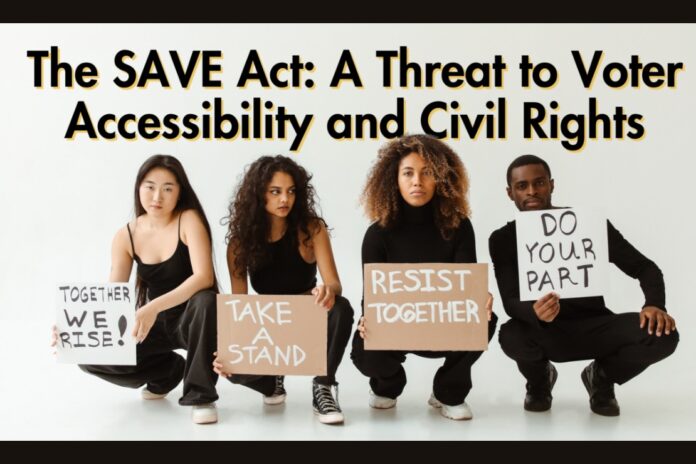Barriers at the Ballot Box: The Real Intent Behind the SAVE Act
In the opinion of many political pundits, our democracy has often been described as being rather fragile – dependent upon the highest level of engagement and participation of the citizenry. As a result of this perception, one must look at the right to vote and who will be elected, as representatives of those who are eligible to vote and who actively exercise that option.
Voting Wasn’t Always for Everyone
Early on, in this country, only white men who owned property could vote. Ultimately, via significant struggle and constant sacrifice, progress was made. There has been the Reconstruction Amendments (13th, 14th and 15th) – ratified in 1865, 1868 and 1870 respectively, abolished Slavery, guaranteed equal protection of the laws and the right to vote.
Power in the Hands of Women
Next up was the 19th Amendment, which established “the right of citizens of the United States to vote shall not be denied or abridged by the United States or by any State on account of sex.” Congress was given the power to enforce this article by appropriate legislation.
Citizenship for Native Americans
In 1924, President Coolidge signed into law the Indian Citizenship Act, which ended a long debate and struggle, at the federal level, over full birthright citizenship for American Indians.
The Legacy—and Loss—of the Voting Rights Act
Moving historically ahead, the 1965 Voting Rights Act, described as “one of the most successful civil rights measures, in history”, but, the Supreme Court has dismantled it. This Act was enacted “as a comprehensive tool meant to undo the political hold of Jim Crow policies”, in the South and related discriminatory structures nationwide. The law fundamentally opened political opportunities for black and brown communities to participate in all aspects of the political system on an equal basis. It is well documented as to how the Supreme Court has eroded the protections, of Sections 5 and 2, of this historic legislation.
The SAVE Act: A Setback in Disguise
We now have a new piece of legislation, passed by the House of Representative, earlier this year, which poses a significant threat to democracy, as it is manifesting great resistance to the expansion of civil rights and freedoms. It’s known as the SAVE ACT, and it is viewed as a “dangerous and disingenuous bill”, that would make it harder for millions of Americans citizens to vote.
A Document Barrier to the Ballot
This legislation would require people to show a passport, birth certificate or similar document to register to vote. Millions of Americans do not have ready access to these documents! A glaring example of the absurdity, in a lot of minds: married women, many of whom have taken their husband’s last name, couldn’t use their own birth certificates, as the last names would not match. Passports are also reportedly costly and some have argued that this is akin to a “poll tax.”
Growing Pushback from Lawmakers
Questions have arisen and some representatives who initially said they were going to support the bill had a change of heart and opposed this bill. The SAVE Act is now with the Senate. Sustained constituent opposition is critical to prevent its passage and enactment into law. Contact your senator today and urge them to vote no.
Nine Senators Take a Stand
There are nine Senators who have gone on record, as opposing the SAVE ACT, being those from Arizona, California, Colorado, Georgia, Maryland, Michigan, New Jersey, New Mexico and Virginia. This sustained citizen opposition is critical and constituents are being urged to contact their Senators and express their opinions on this legislation.
When Congress Got It Right
We can recall, in history, where Congress acted, in the best interest of the People, to ensure that all citizens had access to the ballot box and were not victims of disenfranchisement. Presently, such is not the case in the House of Representatives.
The Ballot Is Still the Super Power
With midterm elections, in 2026, coming up, voters will have an opportunity to send a new representative, in a lot of areas, which could lead to an end to the erosion of democracy, as we know it. Voting is still the super power. Stay aware and get prepared to vote!








